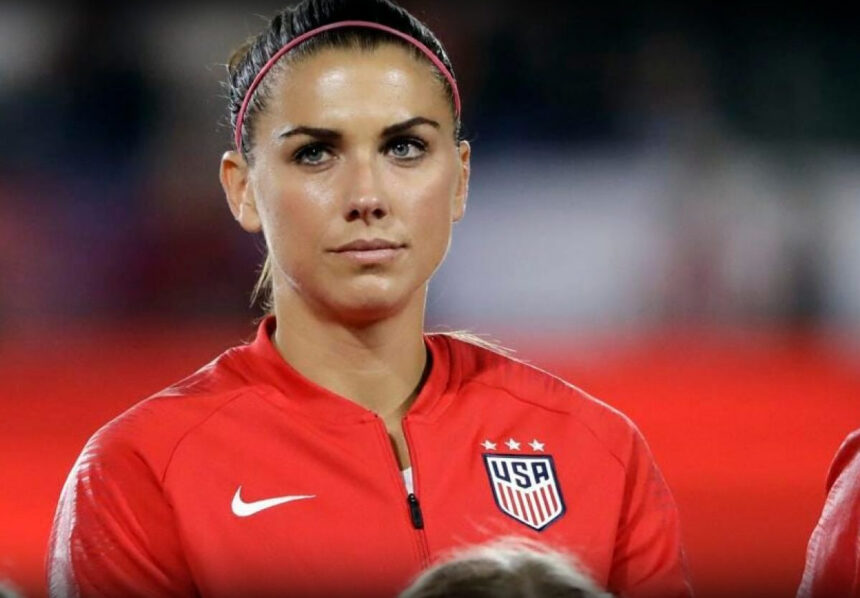Alex Morgan’s name will forever be synonymous with greatness in women’s soccer. Her retirement marks the end of an illustrious career that spans over 15 years, highlighted by goals, championships, and accolades. But Morgan’s legacy is about much more than her impressive statistics on the soccer field. It’s about her fight for gender equity, her advocacy for marginalized communities, and her ability to elevate the sport beyond its traditional boundaries. As we reflect on her career, it becomes clear that her true impact lies in her off-field efforts, which have reshaped the landscape of women’s soccer and inspired athletes across the world.
The Rise of Alex Morgan: A Soccer Phenomenon
Born on July 2, 1989, in San Dimas, California, Alex Morgan grew up playing multiple sports before focusing on soccer in her teenage years. Her speed, agility, and natural goal-scoring abilities quickly made her stand out. She attended the University of California, Berkeley, where she was a standout forward, finishing her collegiate career as one of the school’s all-time leading goal scorers. In 2009, Morgan’s talents earned her a call-up to the U.S. Women’s National Team (USWNT) at just 20 years old.
Morgan burst onto the international scene at the 2011 FIFA Women’s World Cup, where she became a household name, earning the nickname “Baby Horse” for her speed and relentless energy. Though the U.S. fell short of winning that tournament, finishing as runners-up, Morgan’s potential was clear. A year later, she helped lead the USWNT to a gold medal at the 2012 London Olympics, cementing her status as one of the sport’s brightest stars.
Throughout her career, Morgan evolved from a dynamic winger to a more traditional target striker, yet her effectiveness never waned. With over 200 career goals, including 123 for the USWNT, Morgan has etched her name among the greatest to ever play the game.
Building a Platform Through Success
Morgan’s soccer achievements are immense: two FIFA Women’s World Cup titles (2015, 2019), an Olympic gold medal (2012), and countless domestic and international club championships, including National Women’s Soccer League (NWSL) titles and a UEFA Champions League title. These accolades, combined with her marketability and millions of social media followers, gave her a platform that she could have easily used for personal gain. She was a global superstar, earning lucrative endorsement deals and appearing in countless commercials.
But Alex Morgan was never content with just being a star on the field. She understood the weight of her platform and recognized that her influence could extend far beyond her soccer accomplishments. For Morgan, success on the field was simply a means to advocate for meaningful change off it.
A Champion for Gender Equity
Thank you🫶 pic.twitter.com/8BkofVOh3s
— Alex Morgan (@alexmorgan13) September 5, 2024One of Morgan’s most defining legacies is her role in the USWNT’s fight for gender equity, particularly in the battle for equal pay. The struggle began long before it became headline news in 2019, with Morgan playing a pivotal role behind the scenes and in public. Alongside other prominent players like Megan Rapinoe and Becky Sauerbrunn, Morgan was one of the driving forces in pushing U.S. Soccer to address the massive disparity in pay between the men’s and women’s national teams.
In 2019, the USWNT filed a gender discrimination lawsuit against U.S. Soccer, which eventually led to a landmark equal pay agreement in 2022. The fight was grueling and required years of negotiations, public protests, and even a boycott of the 2017 SheBelieves Cup. Throughout this battle, Morgan’s voice was among the loudest, demanding not only fair compensation but also better working conditions, investment in the women’s game, and respect for the athletes.
In 2020, Morgan described the team’s progress in the fight for equal pay as “good overall,” but she remained steadfast in her belief that the USWNT deserved to be treated equally, both financially and in terms of resources. The equal pay agreement reached in 2022 was a historic victory for women’s sports, and Morgan’s role in making it happen cannot be understated.
Allyship for the LGBTQ+ Community
While her efforts for gender equity are widely recognized, Morgan’s allyship with the LGBTQ+ community is another vital aspect of her legacy. As a straight, cisgender woman, Morgan didn’t have to take on the fight for LGBTQ+ rights. But she chose to use her voice to advocate for inclusivity and equality within the sport.
Morgan has been a vocal supporter of LGBTQ+ rights throughout her career. She spoke out against discrimination and injustice, aligning herself with the community during times when other high-profile athletes remained silent. In 2019, she boycotted a USWNT game against Thailand that was scheduled to be played in North Carolina, a state that had recently passed anti-LGBTQ+ legislation. Morgan’s decision to stand in solidarity with the LGBTQ+ community sent a powerful message: her allyship wasn’t performative; it was rooted in her belief in human rights and equality.
Advocate for Athlete-Moms
Morgan’s advocacy extended beyond gender and LGBTQ+ rights to another critical issue: athlete moms. In 2020, Morgan gave birth to her daughter, Charlie, just months before the Tokyo Olympics. Balancing motherhood and professional sports is no easy feat, and Morgan has been open about the challenges she faced. Yet, she used her experience to advocate for better maternity provisions and support for athlete mothers.
While Morgan was fortunate to have access to resources that allowed her to return to the field after giving birth, she recognized that not all athlete-moms were as lucky. She consistently advocated for better maternity leave policies, childcare support, and healthcare benefits for women athletes, ensuring that future generations of athlete-moms wouldn’t have to choose between their careers and their families.
Addressing Systemic Abuse in Women’s Soccer
One of the most significant chapters of Morgan’s off-field legacy involves her role in addressing the systemic abuse within the NWSL. In 2021, Mana Shim and Sinead Farrelly, two lesser-known former NWSL players, bravely came forward to accuse a prominent coach of sexual coercion, harassment, and abuse. Their accusations sent shockwaves through the league, and Morgan immediately put her name behind their cause, confirming details of the abuse and lending credibility to their claims.
Morgan’s involvement in the scandal wasn’t limited to supporting the victims. She played a crucial role in pushing for systemic changes in the league. Behind the scenes, Morgan led hundreds of NWSL players in demanding the adoption of an anti-harassment policy that would protect athletes from future abuse. In public, she called out the NWSL and its commissioner, Lisa Baird, for their failure to address the issue earlier, persistently demanding accountability.
Morgan’s efforts, both in private and public, led to significant reforms within the NWSL, including the dismissal of abusive coaches, an investigation that uncovered widespread misconduct, and a new commitment to creating a safer environment for players. Her role in addressing systemic abuse in women’s soccer will be remembered as one of the most important contributions of her career, not just for the NWSL but for women’s sports as a whole.
A Lasting Impact on the Next Generation
Perhaps the most poignant moment of Morgan’s retirement announcement came when she recounted a conversation with her 4-year-old daughter, Charlie. Charlie told her mother that she wanted to be a soccer player when she grows up. For Morgan, this wasn’t just a proud motherly moment; it was a realization of the impact she has had on the next generation.
Morgan’s legacy goes beyond her personal accomplishments. She helped create a pathway for young girls like Charlie, who can now see a future in professional sports. She fought for the rights and opportunities of future athletes, ensuring that they would have access to resources, equality, and safety within the sport. Morgan’s work has irrevocably changed the landscape of women’s soccer, and her influence will be felt for years to come.
Conclusion: Alex Morgan’s True Legacy
As Alex Morgan hangs up her boots, the soccer world will undoubtedly celebrate her incredible on-field achievements: the goals, the championships, the awards. But her true legacy lies in how she used her platform to effect change. Morgan was a trailblazer, a change-maker, and an advocate for equality. She fought for gender equity, supported marginalized communities, and addressed systemic issues within her sport. Her impact reaches far beyond soccer; she has inspired athletes in every sport to push for a better, more equitable world.
Morgan’s legacy is one of courage, perseverance, and allyship. As her daughter Charlie and countless other young girls look to the future, they will see a world shaped by Alex Morgan — a world where women athletes are treated with respect, given equal opportunities, and empowered to succeed. Morgan’s career may be over, but her influence will last for generations.





